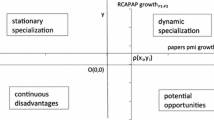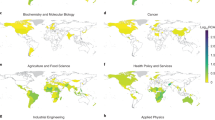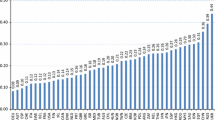Abstract
The Relative Specialization Index (RSI) is an indicator that measures the research profile of a country by comparing the share of a given field in the publications of a given country with the share of the same field in the world total of publications. If measured over time, this indicator may be influenced in the world total by the increased representation of certain other countries with different research profiles. As a case, we study the effect on the RSI for The Netherlands of the increased representation of China in the ISI Web of Science. Although the booming of China is visible in the RSI for The Netherlands, especially in the last decade and in fields where the countries have opposite specializations, the basic research profile as measured by the RSI remains the same. We conclude that the indicator is robust with regard to booming countries, and that it may suffice to observe the general changes in the research profile of the database if the RSI for a country is studied over time.


Similar content being viewed by others
References
den Hertog, P., Jager, C.-J., te Velde, R., Veldkamp, J., Aksnes, D.W., Sivertsen, G., et al. (2012). Science, Technology & Innovation Indicators 2012. Dialogic. Utrecht. http://www.dialogic.nl/documents/2010.056-1235.pdf. Retrieved 21 Jan 2013.
Frame, J. D. (1977). Mainstream research in Latin America and the Caribbean. Interciencia, 2, 143–148.
Glänzel, W. (2000). Science in Scandinavia: A bibliometric approach. Scientometrics, 48(2), 121–150.
Glänzel, W., Debackere, K., & Meyer, M. (2008). ‘Triad’ or ‘tetrad’? On global changes in a dynamic world. Scientometrics, 74(1), 71–88.
Hu, X., & Rousseau, R. (2009). A comparative study of the difference in research performance in biomedical fields among selected Western and Asian countries. Scientometrics, 81(2), 475–491.
Leydesdorff, L., & Zhou, P. (2005). Are the contributions of China and Korea upsetting the world system of science? Scientometrics, 63(3), 617–630.
Rousseau, R., & Yang, L. (2012). Reflections on the activity index and related indicators. Journal of Informetrics, 6, 413–421.
Schubert, A., & Braun, T. (1986). Relative indicators and relational charts for comparative assessment of publication output and citation impact. Scientometrics, 9, 281–291.
Schubert, A., Glänzel, W., & Braun, T. (1989). World flash on basic research: Scientometric datafiles. A comprehensive set of indicators on 2,649 journals and 96 countries in all major science fields and subfields, 1981–1985. Scientometrics, 16(1–6), 3–478.
Second European Report on S&T Indicators (1997). Appendix (1997). EUR 17639. Brussels: European Commission.
Tuzi, F. (2005). The scientific specialisation of the Italian regions. Scientometrics, 62(1), 87–111.
Yang, L. Y., Yue, T., Ding, J. L., & Han, T. (2012). A comparison of disciplinary structure in science between the G7 and the BRIC countries by bibliometric methods. Scientometrics, 93, 497–516.
Zhou, P., & Glänzel, W. (2010). In-depth analysis on China’s international cooperation in science. Scientometrics, 82(3), 597–612.
Zhou, P., & Leydesdorff, L. (2006). The emergence of China as a leading nation in science. Research Policy, 35(1), 83–104.
Zhou, Q., Rousseau, R., Yang, L., Yue, T., & Yang, G. (2012). A general framework for describing diversity within systems and similarity between systems with applications in informetrics. Scientometrics, 93, 787–812.
Author information
Authors and Affiliations
Corresponding author
Rights and permissions
About this article
Cite this article
Aksnes, D.W., van Leeuwen, T.N. & Sivertsen, G. The effect of booming countries on changes in the relative specialization index (RSI) on country level. Scientometrics 101, 1391–1401 (2014). https://doi.org/10.1007/s11192-014-1245-3
Received:
Published:
Issue Date:
DOI: https://doi.org/10.1007/s11192-014-1245-3




